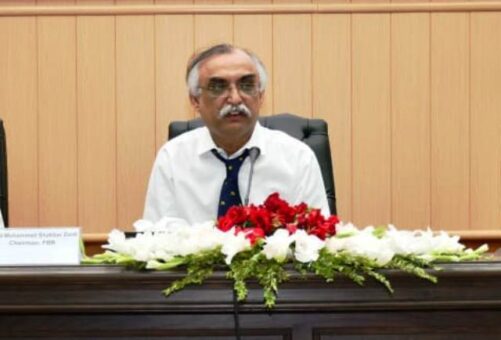ISLAMABAD: Federal Board of Revenue (FBR) on Friday issued manual for filing income tax return and wealth statement for tax year 2019.
The FBR issued SRO 1160(I)/2019 dated September 27, 2019 to notify instructions for filing annual income returns and wealth statement.
The FBR also issued manual paper return forms for individuals. The form has been issued just three days ahead of due date.
The FBR made amendment to SRO 979(I)/2019 dated September 02, 2019 through the latest SRO.
The instructions issued for filing in return form and wealth statement, the FBR said:
The following persons are required to furnish a return of income for a tax year:
(a) Every company;
(b) Every person (other than a company) whose taxable income for the year exceeds PKR 400,000;
(c) Every non-profit organization as defined in clause (36) of section 2;
(d) Every welfare institution approved under clause (58) of Part I of the Second Schedule;
(e) Every person who has been charged to tax in respect of any of the two preceding tax years;
(f) Every person who claims a loss carried forward under this Ordinance for a tax year;
(g) Every person who owns immovable property with a land area of two hundred and fifty square yards or more or owns any flat located in areas falling within the municipal limits existing immediately before the commencement of Local Government laws in the provinces; or areas in a Cantonment; or the Islamabad Capital Territory;
(h) Every person who owns immoveable property with a land area of five hundred square yards or more located in a rating area;
(i) Every person who owns a flat having covered area of two thousand square feet or more located in a rating area;
(j) Every person who owns a motor vehicle having engine capacity above 1000 CC;
(k) Every person who has obtained National Tax Number;
(l) Every person who is the holder of commercial or industrial connection of electricity where the amount of annual bill exceeds rupees five hundred thousand;
(m) Every person who is registered with any chamber of commerce and industry or any trade or business association or any market committee or any professional body including Pakistan Engineering Council, Pakistan Medical and Dental Council, Pakistan Bar Council or any Provincial Bar Council, Institute of Chartered Accountants of Pakistan or Institute of Cost and Management Accountants of Pakistan;
(n) Every individual whose income under the head Business exceeds PKR 300,000 but does not exceed PKR 400,000 in a tax year.
(o) Every individual & AOP deriving property income exceeding Rs. 200,000
According to the general instructions, the FBR said that the following errors / omissions shall render a Return invalid & make the taxpayer a non-filer & liable to penalty under section 182(1):
(a) Return on which CNIC is missing or incorrect or invalid;
(b) Return on which mandatory fields marked by * are empty;
(c) Return which is not signed by the Taxpayer or his Representative (as defined in section 172 of the Income Tax Ordinance, 2001);
(d) Return which is not filed in the prescribed Form;
(e) Return which is not filed in the prescribed mode.
Individuals deriving income under the head Property, Capital Gains & Other Sources (excluding Salary / Business) & Income subject to fixed / final tax have to file one page Return in IT-1B Form with Annex-A, Annex-F & Wealth Statement if required to be filed.
Individuals deriving income under the head business or falling under Final Tax Regime (FTR) such as Commercial Importers, Exporters, Contractors, etc. have to file two page Return in IT-2 Form with Annex-A, Annex-B, Annex-F & Wealth Statement if required to be filed. Annex C, Annex-D & Annex-E are required only where Depreciation / Amortization, Admissible / Inadmissible Deductions & Minimum Tax Chargeable / Option out of Presumptive Tax Regime are involved.
Individuals, including members of AOPs or directors of Companies must file Wealth Statement.
Taxpayers may file Return of Total Income / Statement of Final Taxation & Wealth Statement through the following modes:
Electronically at FBR Portal (https://iris.fbr.gov.pk/infosys/public/txplogin.xhtml) which is mandatory for all Companies, AOPs, Sales Tax Registered Persons, Refund Claimants, Individuals having income under the head Salary and Individuals declaring taxable income of one million and more or turnover or receipts exceeding fifty million.
However, all others are also encouraged to electronically file Return; Manually on paper at Taxpayer Facilitation Counter of the respective Regional Tax Office. Paper Return Form can be downloaded from FBR Website http://www.fbr.gov.pk.
Taxpayers may seek guidance through the following modes:
By calling Helpline 0800 00 227, 051 111-227-227
By visiting the nearest Taxpayer Facilitation Centre (TFC), list of which can be downloaded from FBR website at http://www.fbr.gov.pk
Tax can be paid in any authorized branch of NBP & SBP at any time before filing of return. List of authorized braches of NBP & SBP can be downloaded from http://www.fbr.gov.pk.
Only Foreign Income (Not Loss) should be declared.
Only Agriculture Income (Not Loss) should be declared.
Tax Credits include Tax Credits for the following:
Share in Taxed Income from AOP;
Charitable Donations u/s 61;
Investment in Shares of Public Companies listed on a Stock Exchange in Pakistan (only for Original Allottee other than a Company) u/s 62;
Life Insurance Premium (only for Resident Individual deriving income from Salary / Business) u/s 62;
Contribution to Approved Pension Fund (only for Pakistani Individual registered with FBR / NADRA deriving income from Salary / Business) u/s 63;
Annex-E Taxpayers wanting to opt out of Final Tax Regime (FTR) u/c (56B), (56C), (56D), (56E), (56F), (56G), Part IV, Second Schedule, must file Annex-E.
Annex-F: Only Personal / Household (Non-Business) expenses should be declared.
Annex-F: Expenses borne by more than one person must be declared in total by each person.
For example, if in one family more than one member is contributing to expenses or if more than one family is living jointly & within each family more than one member is contributing to expenses, total expenses under each head must be declared by each member of each family filing his wealth statement & then contribution by other family members be deducted to arrive at own contribution.
Instructions related to Wealth Statement
If rows provided in any segment are inadequate, additional rows may be inserted.
All assets must be delared at cost, including ancillary expenses.
If an asset is acquired under a Hire Purchase Agreement, total price should be declared as asset under the appropriate head & balance payable amount should be declared as liability.
If Wealth Statement is filed for the first time, separate Reconciliation Statement must be filed for each previous year.
Equipment, Plant, Machinery (Non-Business) must be declared with description, for example, Generator, Tubewell, Harvestor, Tractor, Trolley, etc.
Assets created, whether in Pakistan or abroad, in the name of spouse(s), children & other dependents should be declared only if acquired by them with funds provided by you (Benami Assets).
A separate column for assets held outside Pakistan has been added wherein any/all assets held abroad are to be declared at cost in Pak Rupee Value.



